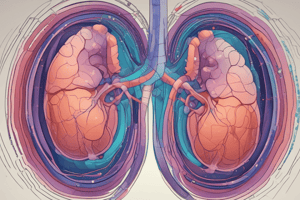Podcast
Questions and Answers
भौतिकी क्या अध्ययन करती है?
भौतिकी क्या अध्ययन करती है?
जीवंत जीवों के कार्यों के लिए उसके भौतिक अंगों के संबंधों का अध्ययन करती है।
कितने स्तरों पर जीवाणु का भौतिकी अध्ययन करती है?
कितने स्तरों पर जीवाणु का भौतिकी अध्ययन करती है?
जीवाणु का भौतिकी अध्ययन मानव जीवन के कई स्तरों पर किया जाता है, जैसे मोलेक्युलर, सेल्यूलर, ऊतक, अंग और प्रणाली।
भौतिकीज्ञ किस प्रकार के तकनीकों का उपयोग करते हैं जीवंत जीवों के कार्यों का अध्ययन करने के लिए?
भौतिकीज्ञ किस प्रकार के तकनीकों का उपयोग करते हैं जीवंत जीवों के कार्यों का अध्ययन करने के लिए?
भौतिकीज्ञ जीवंत जीवों के कार्यों का अध्ययन करने के लिए विभिन्न तकनीकों का उपयोग करते हैं, जैसे कि मैदानी भौतिकी, केमी, एलेक्ट्रोफिजियोलॉजी आदि।
तन्तु की भौतिकी क्या है और इसका क्या महत्व है?
तन्तु की भौतिकी क्या है और इसका क्या महत्व है?
कार्डियोवैस्कुलर प्रणाली क्या है और इसका महत्व क्या है?
कार्डियोवैस्कुलर प्रणाली क्या है और इसका महत्व क्या है?
क्या है 'In vitro' अध्ययन का अर्थ?
क्या है 'In vitro' अध्ययन का अर्थ?
किसे 'In vivo' अध्ययन कहा जाता है?
किसे 'In vivo' अध्ययन कहा जाता है?
क्या है 'Mathematical modeling' का मुख्य उद्देश्य?
क्या है 'Mathematical modeling' का मुख्य उद्देश्य?
किस प्रकार के तकनीकों का उपयोग किया जाता है ताकि सेलुलर, ऊतक और अवयव स्तर पर भौतिकीय प्रक्रियाओं की छवियां उत्पन्न की जा सकें?
किस प्रकार के तकनीकों का उपयोग किया जाता है ताकि सेलुलर, ऊतक और अवयव स्तर पर भौतिकीय प्रक्रियाओं की छवियां उत्पन्न की जा सकें?
शारीरिक प्रक्रियाओं की अध्ययन के लिए नवाचारी तकनीकों की उत्पत्ति क्यों आवश्यक है?
शारीरिक प्रक्रियाओं की अध्ययन के लिए नवाचारी तकनीकों की उत्पत्ति क्यों आवश्यक है?
Study Notes
Physiology: The Fascinating Science of Life's Functions
Biology encompasses a diverse range of subjects, and one of the most renowned is physiology. This field delves into the complex mechanisms that govern the function of living organisms at various levels, from molecules to systems. To grasp the essence of physiology, consider the following aspects, which are essential to understanding this discipline.
Structure and Function
Physiology explores the relationships between structure and function in living organisms. It examines how the complex organization of cells, tissues, and organs enable life's processes and supports survival.
Levels of Organization
Physiology studies life's functions at multiple levels of organization. These include:
- Molecular physiology: Explores cellular processes such as enzyme action, ion transport, and gene regulation.
- Cellular physiology: Focuses on how cells interact and produce specific responses to maintain homeostasis.
- Tissue physiology: Examines the collective functioning of specialized tissues, like muscle, nerve, and glandular tissues.
- Organ physiology: Investigates the functioning of whole organs and their interactions within the body, such as the heart, liver, and kidney.
- System physiology: Explores the interplay between multiple organ systems, like the cardiovascular, respiratory, and nervous systems.
Methods and Measurements
Physiologists use a variety of techniques to study life's functions, including:
- In vitro studies: Examine cellular processes outside their natural environment—for example, in a test tube.
- In vivo studies: Examine living organisms within their natural environment, such as laboratory animals or humans.
- Mathematical modeling: Develop mathematical representations of physiological systems to help identify patterns and make predictions.
- Imaging techniques: Generate images of physiological processes to visualize them at the cellular, tissue, and organ levels.
Challenges and Advances
Like any scientific discipline, physiology faces challenges and opportunities for advancement. For instance, the complexity of biological systems necessitates interdisciplinary collaboration, and the development of novel techniques to examine physiological processes in greater detail.
Relevance to Human Health
Physiology is central to understanding human health and disease. By uncovering the mechanisms underlying life's functions, physiologists contribute to the development of treatments and therapies for diseases such as heart disease, diabetes, and neurological disorders.
As you delve deeper into the fascinating world of physiology, remember that its insights are essential for understanding the intricate mechanisms that support life. By examining structure and function at various levels of organization, physiologists contribute to our scientific understanding of life and health.
Studying That Suits You
Use AI to generate personalized quizzes and flashcards to suit your learning preferences.
Description
Explore the intricate world of physiology, a field that delves into the complex mechanisms governing living organisms at various levels. From structure and function to levels of organization, methods, challenges, and relevance to human health, physiology offers valuable insights into life's functions.



